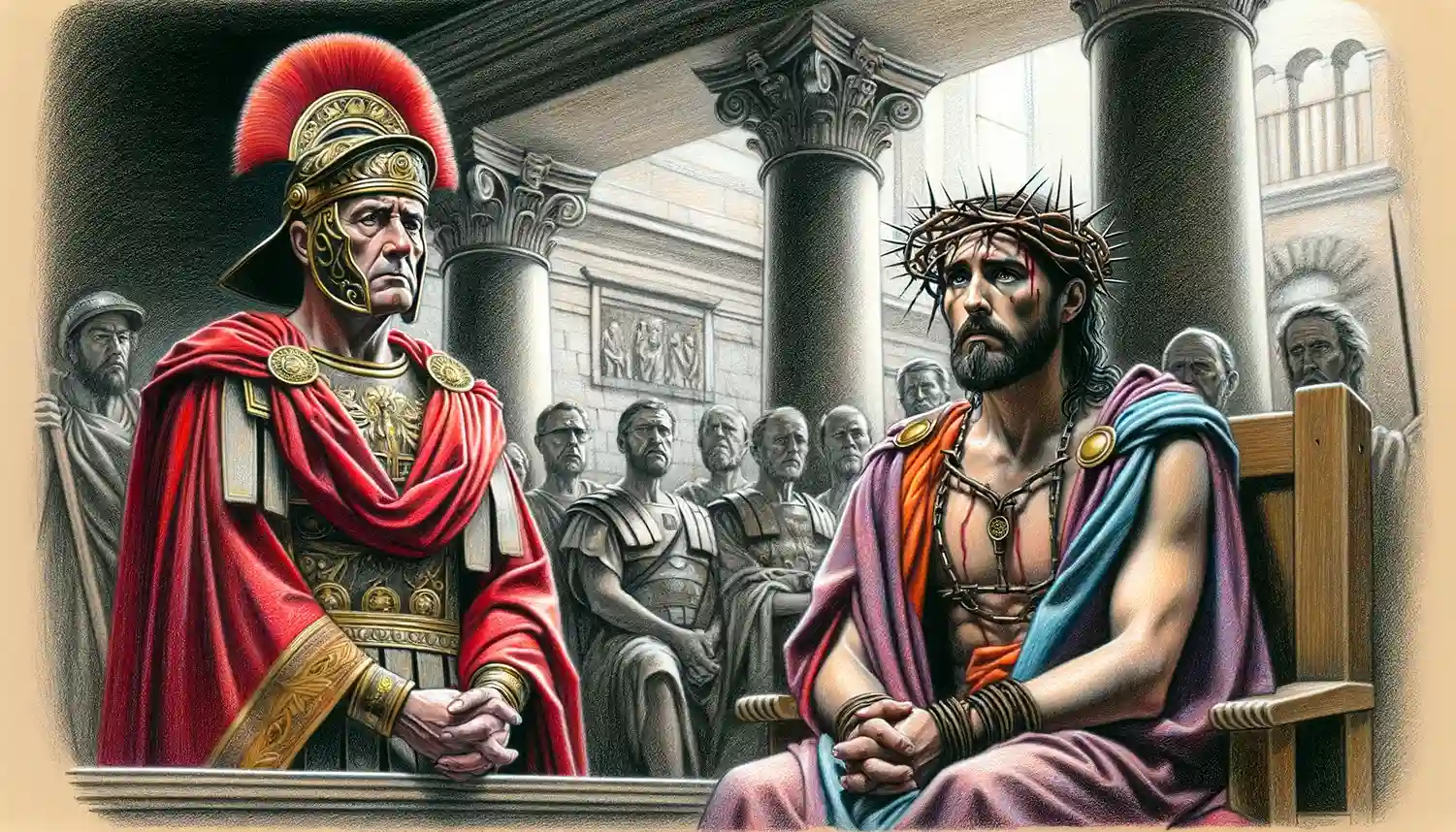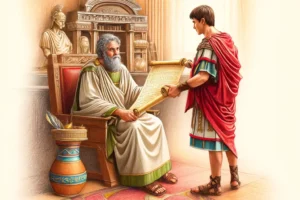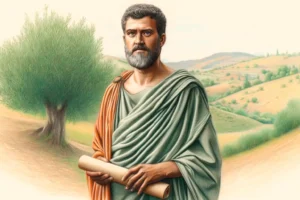
Pontius Pilate: Roman Governor who Sentenced Jesus to Crucifixion
Pontius Pilate, the Roman governor of Judea, is most famously known for presiding over the trial of Jesus and sentencing Him to crucifixion. His role in the Passion narratives has made him a central figure in Christian theology and history.
Quick Facts
- Roman Governor: Pilate served as the Roman prefect (governor) of Judea from 26-36 A.D.
- Trial of Jesus: He presided over the trial of Jesus and ultimately sentenced Him to be crucified.
- Reluctance to Condemn: The Gospels portray Pilate as reluctant to condemn Jesus, finding no fault in Him.
- Washing of Hands: According to Matthew’s Gospel, Pilate symbolically washed his hands to show he was not responsible for Jesus’ death (Matthew 27:24).
- Inscription on the Cross: Pilate ordered the inscription “Jesus of Nazareth, King of the Jews” to be placed on the cross (John 19:19).
- Historical Sources: Pilate is mentioned by contemporary historians such as Josephus and Tacitus.
- Conflict with Jewish Leaders: His tenure was marked by tension and conflict with the Jewish authorities and population.
- Later Life: Little is known about Pilate’s life after his return to Rome; some traditions suggest he was recalled due to complaints about his governance.
Roman Governor of Judea
Pontius Pilate served as the prefect of Judea under Emperor Tiberius from 26 to 36 A.D. As the Roman governor, Pilate had significant administrative and judicial authority, including the power to enforce Roman law and maintain order in the region. His position required balancing the interests of Rome with the diverse and often tumultuous population of Judea.
Trial and Crucifixion of Jesus
Pilate’s most notable involvement in biblical history is his role in the trial and crucifixion of Jesus. The Gospels present a complex picture of Pilate. He initially appears reluctant to condemn Jesus, repeatedly stating that he found no basis for a charge against Him (Luke 23:4, John 18:38). However, under pressure from the Jewish leaders and the crowd, who threatened to report him to Caesar for allowing a rival king, Pilate eventually capitulated and handed Jesus over to be crucified (John 19:12-16).
Washing of Hands
In the Gospel of Matthew, Pilate attempts to distance himself from the decision to crucify Jesus by washing his hands before the crowd, declaring, “I am innocent of this man’s blood. It is your responsibility!” (Matthew 27:24). This act of handwashing has become a symbol of attempting to absolve oneself of responsibility.
Inscription on the Cross
Pilate ordered the inscription “Jesus of Nazareth, King of the Jews” to be placed on Jesus’ cross (John 19:19). When the Jewish leaders protested, asking him to change it to “He claimed to be the King of the Jews,” Pilate refused, stating, “What I have written, I have written” (John 19:21-22). This inscription highlighted the charge against Jesus and subtly mocked the Jewish authorities.
Historical Sources
Beyond the New Testament, Pilate is mentioned by the Jewish historian Josephus and the Roman historian Tacitus. Josephus describes Pilate as a harsh ruler whose actions often incited the Jewish population, leading to complaints against him (Antiquities of the Jews 18.3.1-2). Tacitus briefly mentions Pilate in the context of Jesus’ execution (Annals 15.44).
Conflict with Jewish Leaders
Pilate’s tenure was marked by frequent conflicts with the Jewish leaders and populace. He was known for his heavy-handed tactics, including using Temple funds to build an aqueduct and violently suppressing protests. These actions further strained his relationship with the Jewish community and contributed to his unpopularity.
Later Life and Legacy
Little is known about Pilate’s life after he left Judea. According to some traditions, he was recalled to Rome to answer for his handling of a Samaritan uprising. His later fate is uncertain, with various apocryphal accounts suggesting different outcomes, including exile or suicide.
Theological Themes
- Reluctance and Responsibility: Pilate’s reluctance to condemn Jesus and his attempt to absolve himself of responsibility highlights the tension between personal conviction and political expediency.
- Divine Sovereignty: Despite Pilate’s role in Jesus’ crucifixion, the New Testament portrays the event as part of God’s sovereign plan for salvation.
- Moral Ambiguity: Pilate’s actions reflect the complexity of moral decisions within the context of political power and pressure.
Legacy and Impact
Pilate’s legacy is primarily defined by his role in the crucifixion of Jesus. He is a figure of both historical and theological significance, embodying the interplay of justice, power, and responsibility. His story continues to be a subject of reflection and interpretation in Christian thought and literature.
Conclusion
Pontius Pilate, the Roman governor of Judea, is best known for his role in the trial and crucifixion of Jesus. His reluctant decision to condemn Jesus, the symbolic washing of his hands, and the inscription on the cross highlight his complex involvement in this pivotal event. Pilate’s actions and their theological implications continue to be significant in Christian history and thought.



